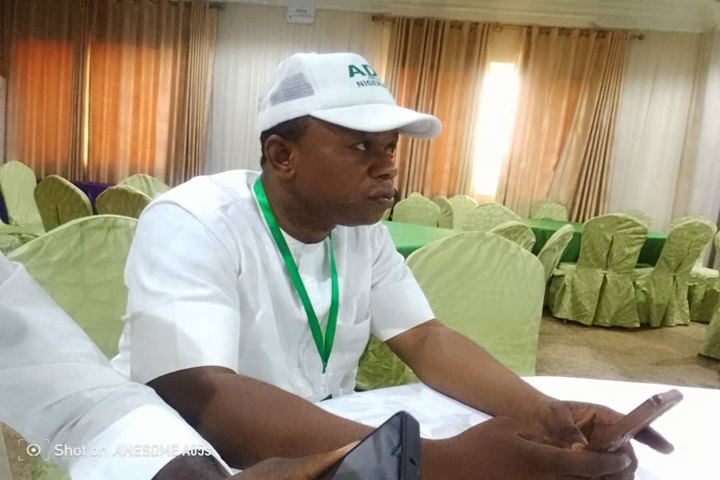In Ekiti State, Nigeria, July 30, 2025- Hon. Ilesanmi Omolayo the Satte Chairman of the African Democratic Congress (ADC) condemned the widespread political deception currently unfolding in Ekiti State.
Meanwhile, on Monday, July 28, 2025, Ekiti unexpectedly became a hotbed of political activity and intense debate among citizens.
Remarkably, former Governor Ayo Fayose, a prominent figure in the People’s Democratic Party (PDP), publicly endorsed Governor Biodun Oyebanji of the APC.
Interestingly, this endorsement took place at a rally organized by the All Progressives Congress (APC), which caught many attendees completely off guard.
Consequently, this surprising move has attracted widespread criticism and ignited debates regarding the integrity of political endorsements.
Critics argue that such actions undermine the principles of democracy and good governance in Nigeria.
They claim that the endorsement was merely a theatrical display lacking genuine intent.
Moreover, Fayose’s decision to wear the cap of the PDP while expressing support raises questions.
Many individuals are now questioning the motives behind this unexpected alliance, wondering if it signifies a shift in political strategy.
Political observers and citizens alike express concerns about the implications of such gestures on governance priorities.
Hon. Ilesanmi Omolayo, Chairman of the African Democratic Congress (ADC) in Ekiti State, promptly condemned the event.
He issued a strongly worded statement, labeling the endorsement as “deceptive” and highlighting the troubling state of politics in the State.
Omolayo emphasized that such hypocrisy insults the intelligence of voters and reveals leaders’ desperate attempts to maintain power.
Furthermore, he criticized the focus on extravagant rallies and endorsements while essential issues remain unaddressed.
Critical matters such as education, healthcare, and infrastructure continue to be neglected, reflecting a concerning trend in political priorities.
Thus, this situation prompts a call for genuine political accountability and a reevaluation of leadership strategies in Ekiti State.
“Ekiti roads are in deplorable condition, schools are deteriorating, and healthcare centers lack essential drugs.
Yet politicians continue to stage lavish events that fail to address the pressing needs of struggling families,” he said.
Leadership Crisis in Ekiti
The incident has reignited discussions about leadership failures in Ekiti State.
Despite receiving over ₦300 billion in federal allocations since 2022, the state continues to grapple with significant challenges.
Reports indicate that over 70% of rural roads remain impassable, severely impacting farmers’ livelihoods and economic stability.
Pensioners face tragic delays in receiving their gratuities, while politicians reportedly spend millions renovating private mansions.
These glaring disparities have led many to question the priorities of Ekiti leaders.
Critics argue that true leadership should focus on providing essential services such as clean water, quality education, and functional healthcare rather than engaging in political horse-trading or staging elaborate rallies.
“Leadership requires substance, not mere performances designed for show,” Omolayo emphasized.
He pointed to examples from Lagos and Akwa Ibom States, where focused governance has led to transformative progress.
“Ekiti’s leaders must prioritize fixing roads and improving healthcare before hosting celebrations,” he added.
Call for Accountability and Citizen Action
The endorsement controversy has sparked calls for greater accountability in governance.
Omolayo urged citizens to reject deceitful political maneuvers and demand transparency in how public funds are spent.
“The power to change Ekiti lies with voters, not political godfathers,” he said, encouraging communities to organize and hold leaders accountable for their promises.
He also highlighted the importance of monitoring government projects and budgets while actively participating in governance processes.
“Ekiti’s revival begins when citizens stop applauding failure and start demanding excellence from their leaders,” Omolayo stated.
Political analysts have echoed these sentiments, noting that the endorsement circus reflects a broader leadership crisis in Nigerian politics.
Fayose’s actions have been described as emblematic of the lack of ideological consistency and commitment to public service that plagues many politicians.
Hope for an Alternative Vision
Despite the challenges, Omolayo expressed optimism about the ADC’s grassroots approach to governance.
The party has prioritized healthcare and education as key pillars of its vision for Ekiti’s development.
“Other states prove that progress is possible; Ekiti’s leaders simply lack the will to act,” he said.
The ADC’s emphasis on community-driven solutions offers a glimmer of hope for residents seeking meaningful change.
However, Omolayo stressed that real progress requires collective action from all citizens.
“Support parties with verifiable plans rather than empty slogans,” he advised.
The political drama surrounding Fayose’s endorsement has exposed deep-rooted issues in Ekiti’s governance structure.
It serves as a reminder that leadership should be measured by its impact on citizens’ lives rather than political alliances or theatrics.
As Ekiti grapples with its challenges, the path forward lies in demanding accountability, rejecting mediocrity, and prioritizing the welfare of its people.
“The time for passive acceptance is over—Ekiti must rise,” Omolayo concluded.







